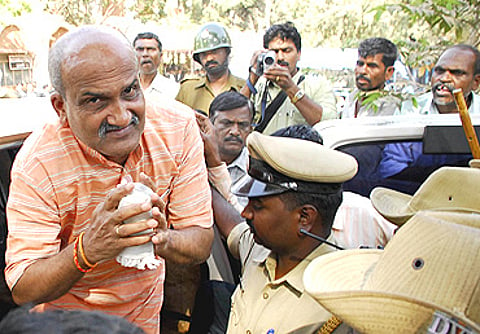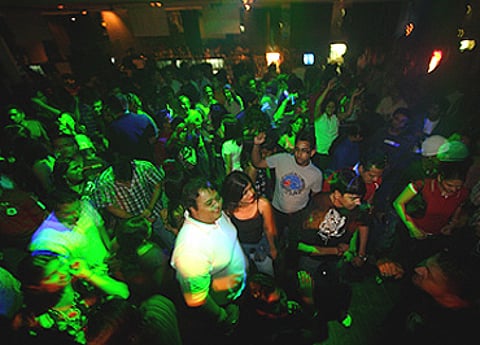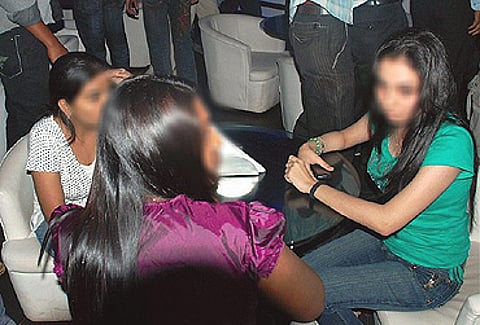Deccan, Chronic?
Judging by recent events, the IT state seems to be becoming the new bastion of Hindu intolerance. What led up to this, and what's next?
One expected the chief minister to be embarrassed by the shocking incident. He wasn’t. Instead, he looked perplexed and in denial. Approached by Outlook, he asserted that there has been "no major law and order problem" since he came to power last year. His home minister Dr V.S. Acharya too was dismissive. "It’s all media hype," he said. "A small and trivial incident has been blown out of proportion. It is nonsense. The media has devalued itself by reporting it."
Acharya’s attitude had been no different last season when, radiating from epicentre Mangalore, churches across the state were attacked. "Why such a fuss when no deaths have occurred," he is reported to have said. "The situation was under control within two days," he had added, prompting his former party colleague and MP H.T. Sangliana to say that the home minister speaks like a "fire brigade officer". Acharya stuck to the script this January 25 as well, declaring that the situation in the precincts of the pub was brought under control within 10 minutes of the incident.
It’s this apparent lack of remorse that troubles many. Says a teacher at a Catholic institution in Mangalore: "They seem to be confusing their simple majority government for a Hindu majority government." The government’s reaction too seems to be following a set pattern. When the attacks on churches broke out, it tactically distanced itself from the Bajrang Dal, which was seen as the major aggressor, and arrested its local chief, Mahendra Kumar. This time too, the government is dissociating itself from the culprit, the Sri Rama Sene. "The Rama Sene is not part of the parivar, its national chief Pramod Mutalik was publicly disowned by us four years ago," said a BJP leader from Udupi. "He was with us for 30 years, but he was sent out as he developed electoral ambitions and we found out that his group was collecting hafta. In fact, the Congress funded him during the last assembly polls to divide the BJP vote." The CM said much the same to the media: "The Sri Rama Sene has nothing do with the Sangh parivar, I am telling you honestly."

Mutalik, who began as an RSS and VHP worker and was loaned to the Bajrang Dal, quit it four years ago to float his own outfit which was aligned first with the Shiv Sena and then with Uma Bharati’s breakaway faction. His basic loyalties, though, still lie with the BJP. Prior to his arrest on January 27, he said: "The Congress is trying to exploit the situation and wants to bring a bad name to the BJP government."
The fact that Mutalik enjoys Sangh and BJP support is evident. In August 2007, when Yediyurappa was deputy CM in the H.D. Kumaraswamy cabinet, as many as 51 cases were withdrawn against parivar men, including Mutalik. The government’s internal correspondence, accessed by Outlook, said: "The government has decided to withdraw the 51 cases...filed against Bajrang Dal activists in Haveri, Shimoga, Belgaum, Gadag, Bijapur, Mandya, Bagalkot, Kodagu, Dharwad, Uttara Kannada and Dakshina Kannada districts".
Mutalik is the first accused in many of these cases while VHP leader Praveen Togadia figures prominently in others. The firs give a detailed account of how Mutalik, Togadia and their associates made incendiary speeches against Muslims. Some cases even have video proof. Sources in the government say the cases were withdrawn despite "stiff resistance" from the legal department and the police.
Incidentally, Mutalik has also been linked to Malegaon blast accused Prasad Purohit. Maharashtra ATS officials left for Mangalore on January 29 to investigate whether Mutalik was aware of and/or involved in the blasts conspiracy. Sources, though, say that current evidence shows that Mutalik had just earned praise from Purohit, who nursed the grandiose ambition of creating a Hindu rashtra through an alignment of all radical Hindu groups across the country and sympathetic governments abroad.
Meanwhile, less than a month ago, the Yediyurappa government decided to withdraw many cases against parivar activists in the Baba Budangiri/Datta Peeta controversy in Chikmagalur. Which begs the question: if the parivar was indeed estranged from Mutalik and his outfit, why did the BJP government generously withdraw cases against him? Also, if the government was serious about containing communal violence, especially in a sensitive milieu following the church attacks, what signal was it sending by withdrawing the cases? Wouldn’t it embolden the parivar outfits? The police now say that it will book the Sri Rama Sene activists under the Goonda act and is also planning to invoke the Unlawful Activities Prevention Act, but what is the guarantee that they will not be forced to withdraw them after public fury has abated?

Also, even if one completely discounts the Mangalore pub incident as "trivial" as the BJP government wants us to believe, it still has a lot of answering to do considering the number of communal stirrings (
However, the most common reason by far for a communal flare-up relates to the ‘mingling’ of youngsters from different communities. G. Rajashekar, co-author of The Dark Faces of Communalism, a book on communalism in Karnataka, says that according to data he has collected between May 2008 and now, there have been "14 recorded incidents of violence against Hindu girls for having been seen with either a Muslim or a Christian boy". Prof Phaniraj, a rights activist teaching at a Manipal engineering college, says: "Since 1998, the frequency of communal incidents in the Dakshina Kannada area has increased. Between 1998 and 2000, communal incidents were reported every six months, every month between 2000 and 2004, and from 2004 on, we find that incidents occur every week."
The invariable plot for violence, he adds, is about a boy from a Muslim or Christian community ‘found being friendly’ with a Hindu girl, which leads to the self-styled protectors of the Hindu faith ‘intervening’ to ‘free’ the girl. Except intervening here means thrashing the boy. "We should remember that there was a sustained campaign against the Muslim community in Gujarat before Godhra happened," says Phaniraj. Just prior to the Surathkal riots in 1998, a lot of pamphlets warning young Hindu women against going with Muslim boys were circulated. "One of them asked Hindu women to be cautious of Muslim men in footwear shops."
In fact, you would indeed think the Mangalore pub incident to be ‘trivial’ compared to earlier incidents in the region (

Rajashekar rues that even people have become insensitive. "The pub incident is not a one-off criminal act as the CM and home minister are trying to project," he says. "It is part of a political programme. The fact that TV cameras were in position before the incident took place reminds me of the Walter Benjamin observation that ‘Fascism makes a spectacle of its ideology’. People are not shocked by what has happened. They simply watched it like any TV serial."
Father Prashant Madtha, former principal of St Aloysius College, Mangalore, attributes the frequent eruptions in the city to a clash of cultures. "Because of the various educational institutions in the area, Mangalore has witnessed an influx of people from across India. The locals feel threatened by the outsiders and feverishly protect their culture from corruption."
Amidst all this are fears that the constabulary too has been communalised. But state DG and IG of police, R. Srikumar, dismisses the idea outright. "It is easy for people to pass value judgements," he says. "Let those who accuse us give us in writing the names of officers who have acted communally and we’ll investigate the charges."
The other worry is the media. "The local media here has coopted the language of the parivar," rues Phaniraj. "So, the common man has started accepting propaganda without questioning it." The general attitude of the Sangh to media non-compliance was evident in the case of B.V. Seetharam, the editor of the Mangalore-based newspaper Karavali Ale and a Sangh critic. Handcuffed and arrested in an alleged extortion case on January 6, he is still in prison.
The quality of public discourse too seems to have reached a nadir ever since the BJP has come to power. There seems to be no middle path. Following the church attacks, a mainstream Kannada newspaper ran a poisoned debate on the issue of conversions for over a month. The right-wing historian and novelist S.L. Bhyrappa, who opened the debate, claimed that "there was an alarming increase in conversions ever since Sonia Gandhi had come to power". He also endorsed a study which said that every day "5,000 people in India were converting to Christianity".
Besides the coastal districts, there has been an uneasy calm at other flashpoints like Baba Budangiri since 2004, where the Sangh parivar is hell-bent on converting the Sufi shrine with a rich tradition of religious syncretism into an exclusive Hindu pilgrimage centre. BJP leader H.N. Ananth Kumar had vowed to make it the ‘Ayodhya of Karnataka’. The Hubli Idgah Maidan issue had cropped up temporarily in September 2004 when Uma Bharati courted arrest and lost her chief ministership, but there has been little noise since then. The silence is eerie, however, and with a BJP government in power, pregnant.
Tags